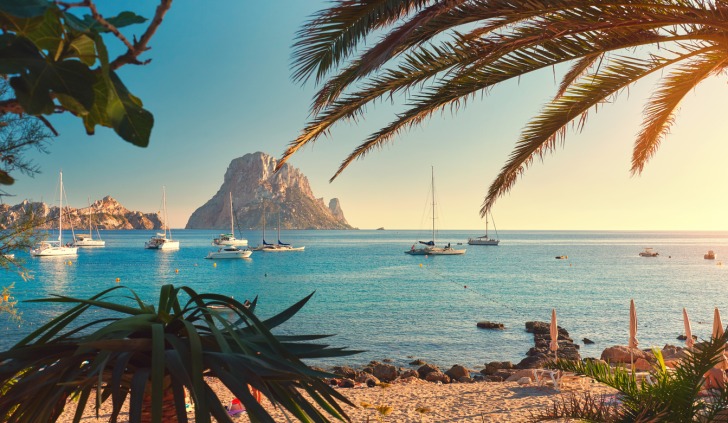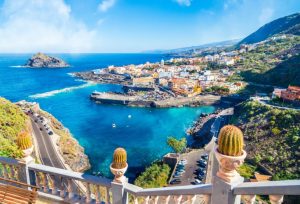 Spain : Safety by City
Spain : Safety by City
- Alicante
- Andorra la Vella
- Barcelona
- Bilbao
- Cadiz
- Canary Islands
- Granada
- Ibiza
- Las Palmas
- Madrid
- Malaga
- Murcia
- Palma de Mallorca
- Pamplona
- Salamanca
- San Sebastian
- Seville
- Valencia
- Zaragoza
Located off the coast east of Valencia and south of Barcelona, Ibiza is part of the Balearic Islands with several municipalities, including Ibiza Town, Santa Eularia des Riu, and San Rafael.
Best known for its nightlife, Ibiza is a clubbers’ paradise with nightlife starting after midnight and shutting down at dawn or later.
However, many travelers head to the island for a relaxing vacation of sun, sand, and unique Mediterranean food and drinks.
This well-rounded destination also has Dalt Vila, Ibiza’s walled town, the island’s greatest cultural attraction, and a must-see for all visitors.
As a result of its location and population, Ibiza has a low crime rate comprising pickpocketing and other low-level crimes.
Violent crimes are practically unheard of in this paradise, further boosting its popularity.
Before traveling to Ibiza, it’s essential to understand the potential warnings and dangers, the safest and least safe areas to visit, safety tips, and other helpful information.
Keep reading to learn more!
Warnings & Dangers in Ibiza

OVERALL RISK: LOW
Ibiza is incredibly safe to visit since there are few violent crimes. Like most other areas of Europe, the most significant threats are pickpockets and outdoor exposure while visiting the beach. Simply use common sense, and your visit will go smoothly. Best of all, visitors have the option of the party side of the island and the more relaxed areas, so there's an option for every taste!

TRANSPORT & TAXIS RISK: LOW
Ibiza's transportation options are dependable and safe, with taxis, buses, and ridesharing options. When taking a taxi, ensure the drivers aren't attempting to overcharge you or take you down the "long route" to increase the price by following the route on the map. Also, be vigilant on crowded buses since this is where pickpockets operate the most.

PICKPOCKETS RISK: MEDIUM
The greatest risk to tourists is the pickpockets that roam crowded locations looking to steal wallets, phones, and other essential items. As with any destination, try not to carry valuables into public places and always keep them in sight. Also, keep bags and backpacks at the front of your body while on buses, and keep phones and wallets in your front pocket.

NATURAL DISASTERS RISK: LOW
There are no significant natural disaster risks in Ibiza, so visitors shouldn't be hindered. The only risks are the hot sun in the summer and occasional thunderstorms during the spring. Also, rip currents can be problematic, so it's important always to follow the local authorities' instructions regarding swimming in the ocean.

MUGGING RISK: LOW
Although pickpockets are around, the situations rarely turn violent. Kidnapping and mugging are a rare occurrence. However, that doesn't mean you should let your guard down and accept unsolicited drinks or assistance from strangers. Drink spiking is also not an issue on this island, but it has happened in the past.

TERRORISM RISK: LOW
Terrorism in Ibiza is unheard of, even despite events in mainland Europe. It's always important to remain vigilant, be aware of your environment, and report suspicious activities to the local police, but Ibiza is an incredibly safe destination.

SCAMS RISK: MEDIUM
In addition to pickpockets, scammers are around in Ibiza due to the number of tourists that visit each year. Be aware of trileros who put on their shell game, which is meant to be a rip-off. Also, double-check bills in restaurants, especially bars, if you have many drinks in one night. The local staff could overcharge you or charge items that weren't ordered.

WOMEN TRAVELERS RISK: LOW
Spain is an incredibly female-friendly destination, so women won't have any issues traveling alone in Ibiza, as it's common. However, women should avoid poorly lit, abandoned locations, not leave with strangers in secluded places, and use general common sense. Walking alone late at night is never a good idea in any city, so hailing a cap or rideshare back to your accommodation is essential.

TAP WATER RISK: LOW
Spain has excellent drinking water on the mainland and the islands. Many visitors purchase bottled water because it is inexpensive and portable, but refilling at taps is a good idea. Those with sensitive stomachs may not be used to the treatment levels in Europe, so the water may taste funny, but it's perfectly safe to drink.
Safest Places to Visit in Ibiza
The island is safe to visit, especially during high season when plenty of other travelers are there.
In addition to the many coves and beaches, Cala Sant Vicent, Cala Llonga, Playa des Figueral, and Cala Llenya are safe and excellent places to swim safely or sunbathe.
Also, Sant Antoni is one of the best and safest areas on the island to stay and is the party capital.
Places to Avoid in Ibiza
As one of the safest destinations in the Mediterranean, Ibiza is a safe year-round destination, with the busiest times being summer.
While no places need to be avoided on the island, if you aren’t interested in the nightlife scene and want a more laid-back experience, avoid Sant Antoni and Playa D’en Bossa.
These are the most hectic areas of the island.
Nightlife and all-night partying do bring some minor crimes to the area, and the quieter resort side of the island will eliminate these risks.
Safety Tips for Traveling to Ibiza
- Be Vigilant of Your Belongings If a Stranger Approaches You. If a stranger approaches you asking questions, be extra vigilant with your belongings. While the interaction may be harmless, and they try to be friendly, this is also a common trick pickpockets use to distract the target. There’s no reason to be rude to those asking questions, but keep your bag to the front and ensure nothing in your back pocket that can easily be removed without you noticing.
- Don’t Leave Belongings Unattended. Whether at the beach, leaving your car for a few minutes, or sitting in a restaurant, always leave your bags in sight. If you’re going to the beach alone, bring as few items as possible and keep them in your eyesight while swimming. When parking a car, even if for a few minutes, place all items in the truck. Finally, never leave your bag on a chair or go to the restroom at a restaurant without bringing your belongings.
- Drink Plenty of Water. If you’re visiting in the summer, having plenty of bottled water is crucial when going to the beach or out for the day. The hot sun beating down on you will cause dehydration, so having water readily available will prevent headaches, heat exhaustion, and other medical situations.
- Follow Posted Swimming Signs at the Beach. When visiting the beach, there will always be notifications of the current swimming situation for the day. If the lifeguard says it’s not safe to swim due to rip currents, sea life, or other hazards, then don’t go swimming. Also, never swim in the ocean when a lifeguard isn’t on duty, and never swim at night, especially after drinking.
- Keep Items in Your Front Pocket. Always keep your wallet and phone in the front pocket when visiting crowded places or on busy mass transit. If a criminal notices belongings in your back pocket, they can easily lift them before you notice. Removing items from front pockets without the target noticing is much more difficult so this simple trick will save you many financial headaches.
- Leave Valuables at Home. When venturing out for the day or night, it’s important to only bring what you need while out. Despite the low crime rate and excellent police presence, situations occur, and those with expensive electronics or jewelry will be targeted first. Therefore, don’t bring expensive items in public; if you must bring them, don’t be flashy in populated places.
- Keep an Eye on Your Drink. Ibiza is a global destination for nightlife, specifically clubbing until the wee hours of the morning. As a result, people being drugged, most commonly women, is an occurrence. Therefore, it’s critical to keep an eye on your drink while out enjoying the local nightlife. If a patron offers to buy you a drink, make sure the bartender is in full view while making the drink. Also, never leave your drink unattended, as this situation is opportunistic.
- Separate Credit Cards. Generally, when traveling to any destination, it’s important to separate credit cards, bring a card out for the day, and leave the rest in your accommodation. This is a precautionary measure to ensure you still have financial means in the low chance that a robbery or theft occurs while visiting.
- Utilize the Alertcops App. If you are the victim of or witness a crime while visiting the island or feel endangered, use the Alertcops App on your smartphone. This helpful application sends an alert to the local police, which ensures your situation will be quickly and efficiently attended to, regardless of where you are on the island. The app is available for Android and iOS devices.
- Wear Sunscreen. Many visitors want to sleep off their previous night’s activities in the sun. As Ibiza is in the middle of the Mediterranean, the sun is powerful and hot, especially if you’re coming from a cold weather location right after winter. This means you must use sunscreen to avoid painful burns. Remember, sunscreen is not 100 percent waterproof, so it must be applied throughout the day, especially after swimming.
So... How Safe Is Ibiza Really?
Ibiza is a safe island with only a few minor risks to consider when visiting, and it is most controllable.
Taking a few typical precautions will ensure a fun and safe trip.
Always use common sense, and if you have a bad feeling about an area, calmly go back in the direction you came while being aware of your surroundings.
Also, read up on tourist scams before traveling, as scammers are becoming more creative.
Additionally, keeping your bag at the front of your body and your wallet and phone in your front pocket will protect you from pickpocketing attempts.
How Does Ibiza Compare?
| City | Safety Index |
|---|---|
| Ibiza | 82 |
| Andorra la Vella | 89 |
| Madrid | 68 |
| Barcelona | 67 |
| Valencia | 69 |
| Seville | 71 |
| Bilbao | 52 |
| Rio de Janeiro (Brazil) | 43 |
| Sofia (Bulgaria) | 73 |
| Siem Reap (Cambodia) | 63 |
| Phnom Penh (Cambodia) | 61 |
| Niagara Falls (Canada) | 87 |
| Calgary (Canada) | 82 |
Useful Information

Visas
Most countries don't require a visa to enter Spain for all visits under 90 days. For those staying longer, a visa will be required. Also, ensure your passport is valid six months after the return date. If you need clarification on the visa requirements, visit your country's State Department website for more information.

Currency
Spain's official currency is the Euro since it is a part of the European Union. ATMs are scattered across Ibiza Island and are safe to use. Also, most establishments accept credit cards, but it's always important to have cash handy, just in case.

Weather
Ibiza's weather follows the typical Mediterranean climate: mild, rainy winters and hot, dry summers. For this reason, the most popular time to visit Ibiza is during the summer, with many shops and restaurants being closed during the winter months, which see few tourists.

Airports
Since Ibiza is a popular international destination, the Ibiza Airport features year-round domestic routes and seasonal routes to major European cities. Located only four miles southwest of Ibiza Town, the airport is a seasonal base for Vueling, which flies out of many cities across Europe. Currently, the only seasonal direct flights from the U.S. to Ibiza are from JFK Airport in New York City, with Delta and KLM being the carriers.

Travel Insurance
When visiting another country, it's always important to take out travel insurance, which will financially protect you and your belongings if an issue arises. Also, most travel insurance options provide health coverage within the visited countries.
Ibiza Weather Averages (Temperatures)
Average High/Low Temperature
| Temperature / Month | Jan | Feb | Mar | Apr | May | Jun | Jul | Aug | Sep | Oct | Nov | Dec |
|---|---|---|---|---|---|---|---|---|---|---|---|---|
| High °C | 15 | 15 | 17 | 19 | 22 | 26 | 29 | 30 | 27 | 23 | 19 | 16 |
| Low °C | 7 | 8 | 9 | 11 | 14 | 18 | 21 | 21 | 19 | 15 | 11 | 9 |
| High °F | 59 | 59 | 63 | 66 | 72 | 79 | 84 | 86 | 81 | 73 | 66 | 61 |
| Low °F | 45 | 46 | 48 | 52 | 57 | 64 | 70 | 70 | 66 | 59 | 52 | 48 |
Spain - Safety by City
| City | Safety Index |
|---|---|
| Alicante | 77 |
| Andorra la Vella | 89 |
| Barcelona | 67 |
| Bilbao | 52 |
| Cadiz | 74 |
| Canary Islands | 81 |
| Granada | 58 |
| Ibiza | 82 |
| Las Palmas | 74 |
| Madrid | 68 |
| Malaga | 76 |
| Murcia | 83 |
| Palma de Mallorca | 57 |
| Pamplona | 81 |
| Salamanca | 59 |
| San Sebastian | 56 |
| Seville | 71 |
| Valencia | 69 |
| Zaragoza | 79 |











